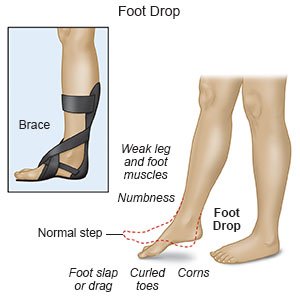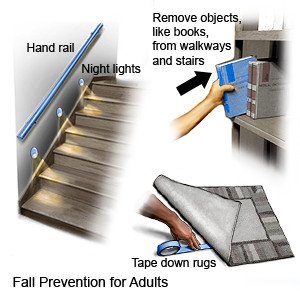Foot Drop
Medically reviewed by Drugs.com. Last updated on Apr 6, 2025.
Foot drop is a nerve and muscle problem that prevents you from flexing or lifting your foot. One or both legs may be affected. Foot drop is most often caused by pressure on a lower leg nerve. It can also be caused by other kinds of nerve damage, muscle disease, or brain or spinal cord damage. Foot drop may be temporary or permanent.
 |
DISCHARGE INSTRUCTIONS:
Return to the emergency department if:
- You fall and hurt yourself.
- The numbness in your legs and feet spreads or worsens.
- Your pain becomes severe.
Call your doctor or neurologist if:
- Your symptoms get worse or do not go away.
- You have more trouble walking, dressing, or playing sports.
- You have questions or concerns about your condition or care.
Medicines:
- Medicine may be given to decrease nerve pain.
- Take your medicine as directed. Contact your healthcare provider if you think your medicine is not helping or if you have side effects. Tell your provider if you are allergic to any medicine. Keep a list of the medicines, vitamins, and herbs you take. Include the amounts, and when and why you take them. Bring the list or the pill bottles to follow-up visits. Carry your medicine list with you in case of an emergency.
Manage foot drop:
- Use an ankle brace as directed. The brace helps retrain your leg to lift your foot. The brace is made of hard plastic and holds your foot in place. This will prevent foot dragging and make it easier to walk.
- Lower your risk for falling. Remove anything you might trip over. Tape electrical cords down. Keep paths clear throughout your home. Make sure your home is well lit. Put nonslip materials on surfaces that might be slippery. An example is your bathtub or shower floor. A cane or walker may help you keep your balance as you walk.

- Go to physical therapy as directed. A physical therapist will teach you exercises to help improve movement and strength, and to decrease pain. The therapist will teach you to shift your body position and stretch your muscles.
Follow up with your doctor or neurologist in 4 to 5 days, or as directed:
Write down your questions so you remember to ask them during your visits.
© Copyright Merative 2025 Information is for End User's use only and may not be sold, redistributed or otherwise used for commercial purposes.
The above information is an educational aid only. It is not intended as medical advice for individual conditions or treatments. Talk to your doctor, nurse or pharmacist before following any medical regimen to see if it is safe and effective for you.
Further information
Always consult your healthcare provider to ensure the information displayed on this page applies to your personal circumstances.
